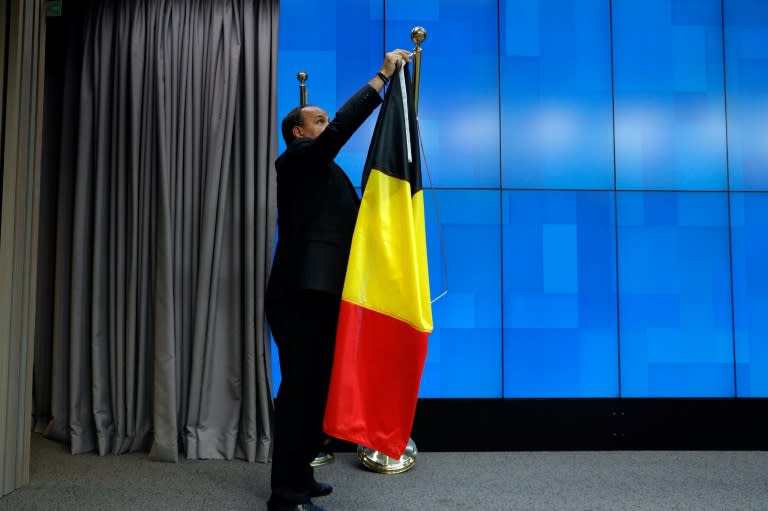Surging far right risks making Belgium even more ungovernable

Belgium votes in national and regional elections on Sunday that could see a surge in support for far-right Flemish separatists that may make forming a government in the divided country more difficult than ever.
After the last elections five years ago, it took Belgium's squabbling politicians 493 days to cobble together a seven-party governing coalition headed by Flemish liberal Alexander De Croo.
This time around the country of some 12 million risks spending even longer without a government as voters in the Dutch-speaking north lurch to the right while their French-speaking compatriots shift to the left.
Split between its rival language camps, Belgium's complex political patchwork has long been seen as borderline dysfunctional. In 2010-2011 it took an unprecedented 541 days to form a government.
"That record seems like it could be broken now," said Benjamin Biard, researcher at the CRISP research centre in Brussels.
After four years in power, the current coalition parties are struggling to convince weary voters they deserve another chance. Polls show they likely won't garner enough seats to form a majority in the 150-seat federal parliament.
Those set to make the biggest gains at Sunday's vote -- which happens the same day as elections for the European Parliament -- instead look like being the far-right Flemish nationalists Vlaams Belang and the Marxist PTB-PVDA Workers' Party.
Pushing a staunchly anti-immigration platform, Vlaams Belang -- which wants independence for its Dutch-speaking heartland -- appears on course to displace the right-wing N-VA as the biggest party in Flanders and claim the highest number of seats (26) in the national parliament.
That could make it harder for the hardline party's more mainstream rivals to stick to a pledge to keep excluding them from any role in governing their region.
For inspiration, Vlaams Belang just has to look over the border at neighbouring Netherlands where far-right ally Geert Wilders forced his way into a ruling coalition after a shock election win last year.
- 'Feeds the extremes' -
Emilie van Haute, a professor at Brussels university ULB, said the fragmented nature of Belgian politics is increasingly pushing voters to the extremes.
"It seems like we're hurtling in that direction, and it isn't clear how we can find a way back," she said.
The political expert said the record number of parties in the current ruling coalition had made it near impossible to push through any major reforms.
As an example, a push to simplify Belgium's byzantine tax system was abandoned in 2023 as the ruling bedfellows failed to reach agreement.
"Voters have difficulty identifying who is responsible and this results in putting all government parties in the same basket, leading to a general rejection which feeds the extremes," van Haute said.
De Croo, however, insists that despite the difficulties the current government has still managed to steer the country through several years of major global turmoil.
After back-to-back crises caused by the Covid pandemic and the fallout from Russia's war on Ukraine, Belgium's economy is growing faster than the European average and salaries kept pace with inflation due to the automatic indexation of wages.
- Headed for impasse? -
While De Croo is angling for another round in the top job, his two most likely challengers will be the leader of the French-speaking Socialist Party Paul Magnette or N-VA top dog Bart De Wever.
But neither of them look set to emerge from the elections in a position of strength.
While N-VA could be surpassed by Vlaams Belang in the north, the Socialist Party could have its long-standing dominance of French-speaking Wallonia challenged by the communist Workers' Party.
The radical left-wing party is one of the few that straddles Belgium's language divide, but it isn't expecting to have a role in governing as its anti-capitalist, anti-EU stance sets it apart from potential partners.
"We are channelling people's anger positively, towards the left," party president Raoul Hedebouw, told AFP.
According to the latest Ipsos poll, the Workers' Party could score close to 20 percent in the Brussels region and 15 percent in Wallonia.
That means its number of seats in the federal parliament would rise to 19, compared to 12 currently.
If that is coupled with the 26 seats predicted for Vlaams Belang, it means some 45 seats will be taken by radical parties who look set to be excluded from any governing deal.
That would seriously diminish any wiggle room for the rest of the field as they seek to cobble together any new coalition to reach the magic majority number of at least 76 deputies.
mad/del/ec/fg

 Yahoo News
Yahoo News 